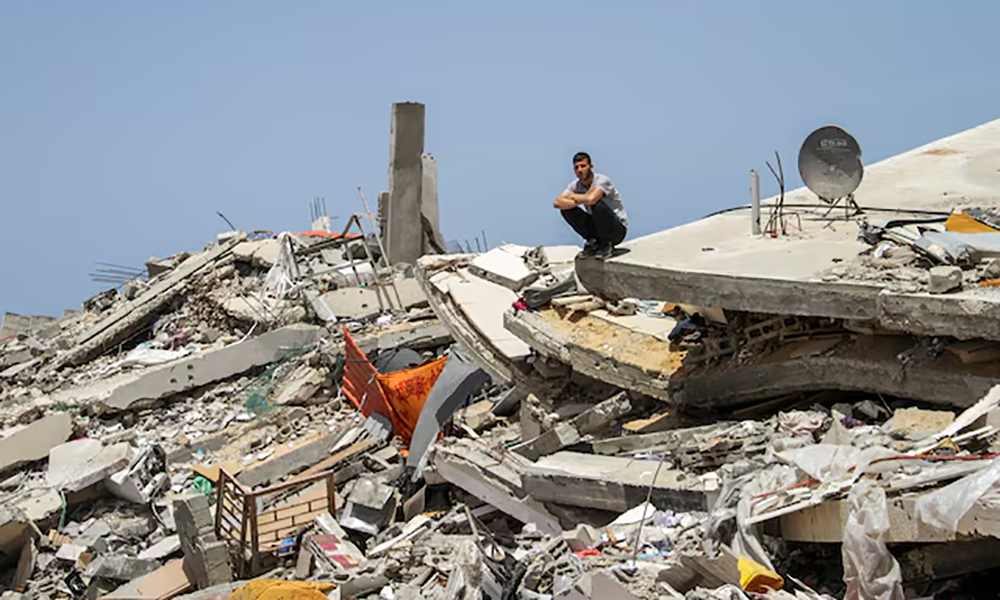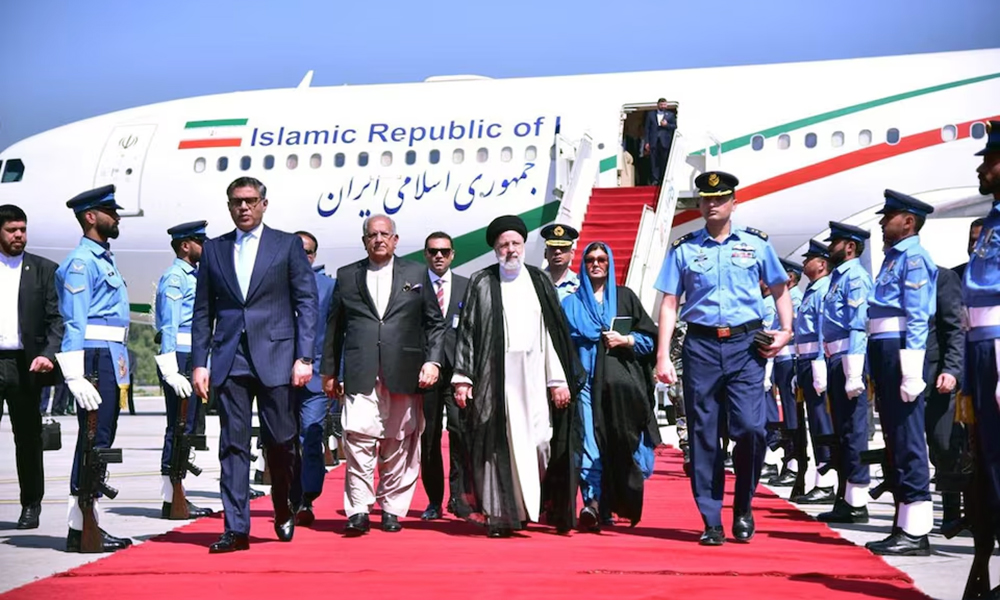Regional
Putin wins Russia election in landslide with no serious competition

President Vladimir Putin won a record post-Soviet landslide in Russia’s election on Sunday, cementing his already tight grip on power in a victory he said showed Moscow had been right to stand up to the West and send its troops into Ukraine, Reuters reported.
Putin, a former KGB lieutenant colonel who first rose to power in 1999, made it clear that the result should send a message to the West that its leaders will have to reckon with an emboldened Russia, whether in war or in peace, for many more years to come.
The outcome means Putin, 71, is set to embark on a new six-year term that will see him overtake Josef Stalin and become Russia’s longest-serving leader for more than 200 years if he completes it.
Putin won 87.8% of the vote, the highest ever result in Russia’s post-Soviet history, according to an exit poll by pollster the Public Opinion Foundation (FOM). The Russian Public Opinion Research Centre (VCIOM) put Putin on 87%. First official results indicated the polls were accurate. The United States, Germany, the United Kingdom and other nations have said the vote was neither free nor fair due to the imprisonment of political opponents and censorship.
Communist candidate Nikolai Kharitonov finished second with just under 4%, newcomer Vladislav Davankov third, and ultra-nationalist Leonid Slutsky fourth, partial results suggested.
Putin told supporters in a victory speech in Moscow that he would prioritise resolving tasks associated with what he called Russia’s “special military operation” in Ukraine and would strengthen the Russian military, read the report.
“We have many tasks ahead. But when we are consolidated – no matter who wants to intimidate us, suppress us – nobody has ever succeeded in history, they have not succeeded now, and they will not succeed ever in the future,” said Putin.
Supporters chanted “Putin, Putin, Putin” when he appeared on stage and “Russia, Russia, Russia” after he had delivered his acceptance speech.
Inspired by opposition leader Alexei Navalny, who died in an Arctic prison last month, thousands of opponents protested at noon against Putin at polling stations inside Russia and abroad.
Putin told reporters he regarded Russia’s election as democratic and said the Navalny-inspired protest against him had had no effect on the election’s outcome.
In his first comments on his death, he also said that Navalny’s passing had been a “sad event” and confirmed that he had been ready to do a prisoner swap involving the opposition politician.
When asked by a NBC, a U.S. TV network, whether his re-election was democratic, Putin criticised the U.S. political and judicial systems.
“The whole world is laughing at what is happening (in the United States),” he said. “This is just a disaster, not a democracy.”
“…Is it democratic to use administrative resources to attack one of the candidates for the presidency of the United States, using the judiciary among other things?” he asked, making an apparent reference to four criminal cases against Republican candidate Donald Trump.
The Russian election comes just over two years since Putin triggered the deadliest European conflict since World War Two by ordering the invasion of Ukraine.
War has hung over the three-day election: Ukraine has repeatedly attacked oil refineries in Russia, shelled Russian regions and sought to pierce Russian borders with proxy forces – a move Putin said would not be left unpunished.
Putin said Russia might need to create a buffer zone inside Ukraine to prevent such attacks in future, read the report.
While Putin’s re-election was not in doubt given his control over Russia and the absence of any real challengers, the former KGB spy had wanted to show he had the overwhelming support of Russians.
Nationwide turnout was 74.22% at 1800 GMT when polls closed, election officials said, surpassing 2018 levels of 67.5%.
There was no independent tally of how many of Russia’s 114 million voters took part in the opposition demonstrations, amid tight security involving tens of thousands of police and security officials.
Reuters journalists saw an increase in the flow of voters, especially younger people, at noon at polling stations in Moscow, St Petersburg and Yekaterinburg, with queues of several hundred people and even thousands.
Some said they were protesting, though there were few outward signs to distinguish them from ordinary voters.
At least 74 people were arrested on Sunday across Russia, according to OVD-Info, a group that monitors crackdowns on dissent.
Over the previous two days, there were scattered incidents of protest as some Russians set fire to voting booths or poured green dye into ballot boxes. Opponents posted some pictures of ballots spoiled with slogans insulting Putin.
But Navalny’s death has left the opposition deprived of its most formidable leader, and other major opposition figures are abroad, in jail or dead.
The West casts Putin as an autocrat and a killer. Ukrainian President Volodymyr Zelenskiy said on Sunday that Putin wanted to rule forever and that the vote had been illegitimate.
Putin portrays the war as part of a centuries-old battle with a declining West that he says humiliated Russia after the Cold War by encroaching on Moscow’s sphere of influence.
Russia’s election comes at what Western spy chiefs say is a crossroads for the Ukraine war and the wider West.
Support for Ukraine is tangled in U.S. domestic politics ahead of the November presidential election.
Though Kyiv recaptured territory after the invasion in 2022, Russian forces have made gains after a failed Ukrainian counter-offensive last year.
Regional
New UK sanctions target Iranian drone industry

Britain on Thursday announced new sanctions targeting Iran’s military drone industry, in response to Iran’s drone and missile attack on Israel earlier this month.
The measures, taken in co-ordination with the U.S. and Canada, target four businesses and two directors at a network of drone companies with the aim of limiting Iran’s ability to launch drones.
“The Iranian regime’s dangerous attack on Israel risked thousands of civilian casualties and wider escalation in the region,” British Foreign Secretary David Cameron said in a statement.
“Today the UK and our partners have sent a clear message – we will hold those responsible for Iran’s destabilising behaviour to account.”
Britain also said it would introduce new bans on the export of drone and missile components to Iran, seeking to limit its military capabilities.
Last week, Britain imposed sanctions on Iranian military figures and organisations, in another coordinated move with the United States, following Iran’s action against Israel.
Iran launched drones and fired missiles at Israel on April 13 as a retaliatory strike for the attack on its embassy compound in Damascus two weeks prior, raising the risk of further escalation in conflict in the Middle East.
(Reuters)
Regional
Turkey accuses U.S. of double standards over Gaza in rights report

Turkey on Wednesday accused the United States of having a policy of double standards on human rights, saying Washington’s annual rights report failed to reflect Israel’s assaults in Gaza, Reuters reported.
Turkey’s foreign ministry said in a statement it was deeply concerned that the U.S. report did not “duly reflect the ongoing inhumane attacks in Gaza”.
The report was prepared with “political motives, far from impartiality and objectivity”, it said, calling on Washington to cease its “double-standard policy on human rights”.
It also cited U.S. ties with the Syrian Kurdish YPG militia which Ankara deems a terrorist organisation.
Israeli forces have killed more than 34,000 Palestinians in Gaza, according to health authorities there, many of them civilians and children. The enclave has been reduced to a wasteland and extreme food shortages have prompted fears of famine.
Israel launched its assault in response to an attack by the Hamas militant group on Oct. 7 in which Israel says 1,200 people were killed. It denies allegations of deliberately causing humanitarian suffering and targeting civilians.
Turkey has denounced Israel for its campaign in Gaza and called for a ceasefire. It has also criticised Western countries for what it calls their unconditional support of Israel, read the report.
In its report, the U.S. State Department said Israel’s war against Hamas had a “significant negative impact” on the human rights situation in Israel.
On Monday, U.S. Secretary of State AntZony Blinken rejected suggestions that Washington might have double standards over Israel’s record.
Regional
Iranian president lands in Pakistan for three-day visit to mend ties

Iranian President Ebrahim Raisi arrived in Islamabad on Monday on a three-day official visit, the foreign office said, amid tight security in the Pakistani capital, Reuters reported.
The visit, which Pakistan’s foreign office said would run until Wednesday, comes as the two Muslim neighbours seek to mend ties after unprecedented tit-for-tat military strikes this year.
“The Iranian president is accompanied by his spouse and a high-level delegation,” Pakistan’s foreign ministry said in a statement, adding that the group also included the foreign minister, other cabinet members and senior officials.
Raisi will meet Prime Minister Shehbaz Sharif and other officials, besides visiting the eastern city of Lahore and southern port city of Karachi, it added.
Major highways in Islamabad were blocked as part of the security measures for Raisi’s arrival, while the government declared a public holiday in Karachi, read the report.
Raisi’s visit is a key step towards normalising ties with Islamabad, but Iran’s supreme Leader Ayatollah Ali Khameni, not the president, has the last say on state matters, such as nuclear policy.
Tension is also high in the Middle East after Iran launched an unprecedented attack on Israel a week ago and central Iran in turn suffered what sources said was an Israeli attack on Friday.
Pakistan and Iran have had a history of rocky relations despite a number of commercial pacts, with Islamabad being historically closer to Saudi Arabia and the United States.
Their highest profile agreement is a stalled gas supply deal signed in 2010 to build a pipeline from Iran’s South Fars gas field to Pakistan’s southern provinces of Balochistan and Sindh, Reuters reported.
Despite Pakistan’s dire need of gas, Islamabad has yet to begin construction of its part of the pipeline, citing fears over U.S. sanctions – a concern Tehran has rejected.
Pakistan said it would seek waivers from the U.S., but Washington has said it does not support the project and warned of the risk of sanctions in doing business with Tehran.
Faced with the possibility of contract breach penalties running into the billions of dollars, Islamabad recently gave the go-ahead for construction of an 80-km (50-mile) stretch of the pipeline.
-

 Latest News3 days ago
Latest News3 days agoRashid Khan named AWCC’s brand ambassador
-

 Regional4 days ago
Regional4 days agoIranian president lands in Pakistan for three-day visit to mend ties
-

 Sport4 days ago
Sport4 days agoKolkata beat Bengaluru by one run in IPL as Kohli fumes at dismissal
-

 Sport4 days ago
Sport4 days agoACL: Aino Mina 3-0 Istiqlal Kabul; Attack Energy 3-0 Khadim
-

 Climate Change4 days ago
Climate Change4 days agoRescuers race to reach those trapped by floods in China’s Guangdong
-

 Business5 days ago
Business5 days agoAfghanistan, Kazakhstan to hold joint expo in Kabul
-

 World3 days ago
World3 days agoMalaysian navy helicopters collide in mid-air, 10 killed
-

 Sport3 days ago
Sport3 days agoJaiswal ton powers Rajasthan to big IPL win
























